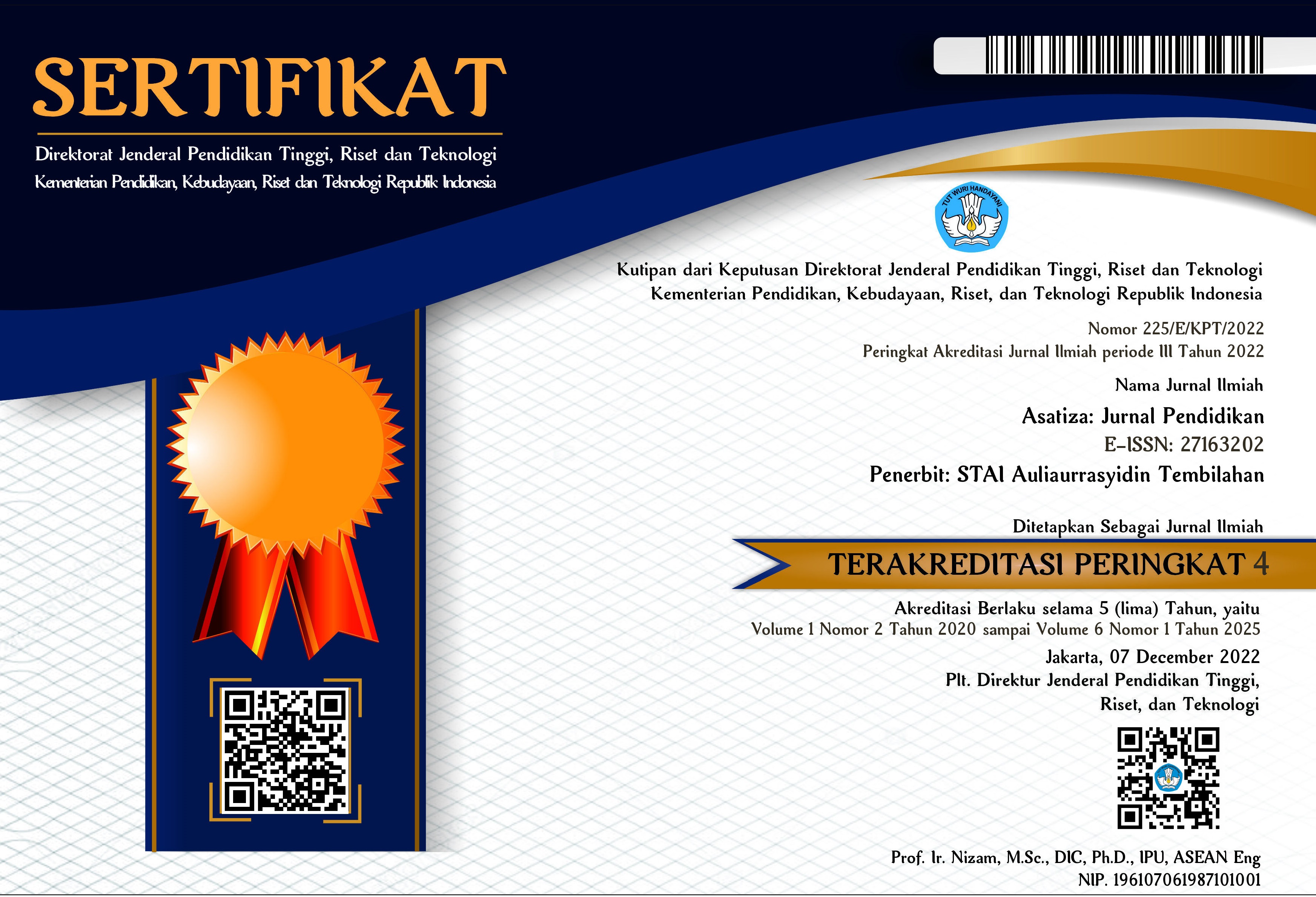Metode Simaan dan Murajaah dalam Menghafal Al-Quran di Pondok Pesantren Nurul Quran Patokan, Kraksaan, Probolinggo
DOI:
https://doi.org/10.46963/asatiza.v4i2.843Keywords:
Quran, Method, Memorize, Simaan, MurajaahAbstract
In the current era, several methods have emerged in the process of memorizing the Koran, but the implementation of the Sima'an and Muraja'ah methods has persisted to this day, especially at the Nurul Quran Kraksaan Islamic boarding school. The aim of this research is to find out the implementation of the simaan and murajaah methods at the Nurul Quran Patokan Islamic Boarding School, Kraksaan Probolinggo. The qualitative approach was chosen by collecting data through observation. The results of the study show that there are supporting and inhibiting factors in memorizing the Al-Quran. The supporting factors are enthusiasm in memorizing the Koran properly and correctly, increasing and being able to reach the target. While the inhibiting factor is prioritizing simaan, namely wanting to memorize a lot but putting aside murojaah. So, it is not uncommon for many students to memorize verse by verse but are not fluent in the previous verses.
Downloads
References
Agung, S. (2017). Penerapan teknik muraja’ah dalam menghafal Al-Quran di Pondok Pesantren Roudlotul Quran Mulyojati Metro.
Arifin, B., & Setiawati, S. (2021). Gambaran strategi pembelajaran tahfidz Al-Quran. Jurnal Pendidikan Tambusai, 5(2), 4886–94. https://www.jptam.org/index.php/jptam/article/view/1709
Gunawan, S., Noor, T., & Kosim, A. (2022). Pembentukan karakter religius melalui program hafal Al- Qur’an. Jurnal Pendidikan Tambusai, 6(2), 11812–11818. https://doi.org/10.31004/jptam.v6i2.4323.
Idayu, H. (2020). Bimbingan dan konseling belajar: Managemen Waktu Penghafal Al Quran dalam meraih prestasi akademik. Konseling Edukasi: Journal of Guidance and Counseling, 4(1), 1–16. https://doi.org/10.21043/konseling.v4i1.7306.
Ilyas, M. (2020). Metode muraja’ah dalam menjaga hafalan Al-Quran. Al-Liqo: Jurnal Pendidikan Islam, 5(1), 1–24. https://doi.org/10.46963/alliqo.v5i01.140.
Masita, R., Khirana, R, D., & Susi, P. G. (2020). Santri penghafal Alquran: Motivasi dan metode menghafal Alquran santri Pondok Pesantren Tahfizul Quran Sungai Pinang Riau. Idarotuna, 3(1), 71-83. https://doi.org/10.24014/idarotuna.v3i1.11339.
Mubarok, H., Ilya, Z., Nisa', R. K., and Nisa', N. K., Anintiya E. O., & Ahmad, H. M. (2022). Mewujudkan generasi emas dan berkarakter disiplin melalui program tahfidz Quran di SD IT Istiqomah Husni. ALSYS: Jurnal: Keislaman dan Ilmu Pendidikan, 2(4), 54-463. https://doi.org/10.58578/alsys.v2i4.435
Mudinillah, A., & Putri, A. (2021). Metode pembelajaran tahfiz Al-Quran di PKBM Markazul Qur’an Sumatera Barat. Mitra PGMI: Jurnal Kependidikan MI, 7(2), 100–112. https://doi.org/10.46963/mpgmi.v7i2.361
Pamungkas, S., Jumini, S. (2018). Pengaruh menghafal Al-Quran terhadap Highorder Thingking Skils (Hots) ditinjau dari motivasi berprestasi mahasiswa. Spektra: Jurnal Kajian Pendidikan Sains 4(1): 25-40. https://doi.org/10.32699/spektra.v4i1.43.
Pramesti, W. R. (2011). Nilai-nilai Pendidikan Karakter Pada Kompetensi Menyimak Dalam Buku Bahasa Jawa SD Remen Basa Jawi Terbitan Erlangga. Under Graduates thesis, Universitas Negeri Semarang. http://lib.unnes.ac.id/id/eprint/5702.
Romziana, L. Wilandari, W., Aisih, L. A., Nasihah, R. A., Sholeha, I., Haslinda, H., & Rahmah, K. (2021). Pelatihan mudah menghafal Al-Quran dengan Metode Tikrar, Murajaah & Tasmi’. Jurnal Karya Abdi Masyarakat 5(1), 161–67. https://online-journal.unja.ac.id/JKAM/article/view/14095.
Sugiyono. (2017). Metode Penelitian Kuantitatif, Kualitatif, Dan R&D. Bandung: Alfabeta.
Widiantoro, W., Purawigena, R. E., & Gamayanti, W. (2017). Hubungan kontrol diri dengan kebahagiaan santri penghafal Al-Quran. Jurnal Psikologi Integratif, 5(1), 11–18. https://doi.org/10.14421/jpsi.2017.%25x
Ziyad, M., Ibdalsyah, I., & Alim, A. (2022). Hubungan pola komunikasi dengan kedisiplinan dan motivasi santri penghafal Al Quran di Pondok Tahfidz Al Quran Ibnu Jauzi Bogor. Koloni, 1(3), 72–79. https://doi.org/10.31004/koloni.v1i3.125
Downloads
Published
Issue
Section
License
Copyright (c) 2023 Imroatul Hasanah, Ahmad Khumaidi, Ummi Lailia Maghfiroh

This work is licensed under a Creative Commons Attribution-ShareAlike 4.0 International License.
Authors who publish with this journal agree to the following terms:
1. Copyright on any article is retained by the author(s).
2. The author grants the journal, right of first publication with the work simultaneously licensed under a Creative Commons Attribution shareAlike 4.0 International License that allows others to share the work with an acknowledgment of the work’s authorship and initial publication in this journal.
3. Authors are able to enter into separate, additional contractual arrangements for the non-exclusive distribution of the journal’s published version of the work (e.g., post it to an institutional repository or publish it in a book), with an acknowledgment of its initial publication in this journal.
4. Authors are permitted and encouraged to post their work online (e.g., in institutional repositories or on their website) prior to and during the submission process, as it can lead to productive exchanges, as well as earlier and greater citation of published work.
5. The article and any associated published material is distributed under the Creative Commons Attribution-ShareAlike 4.0 International License











2.png)



